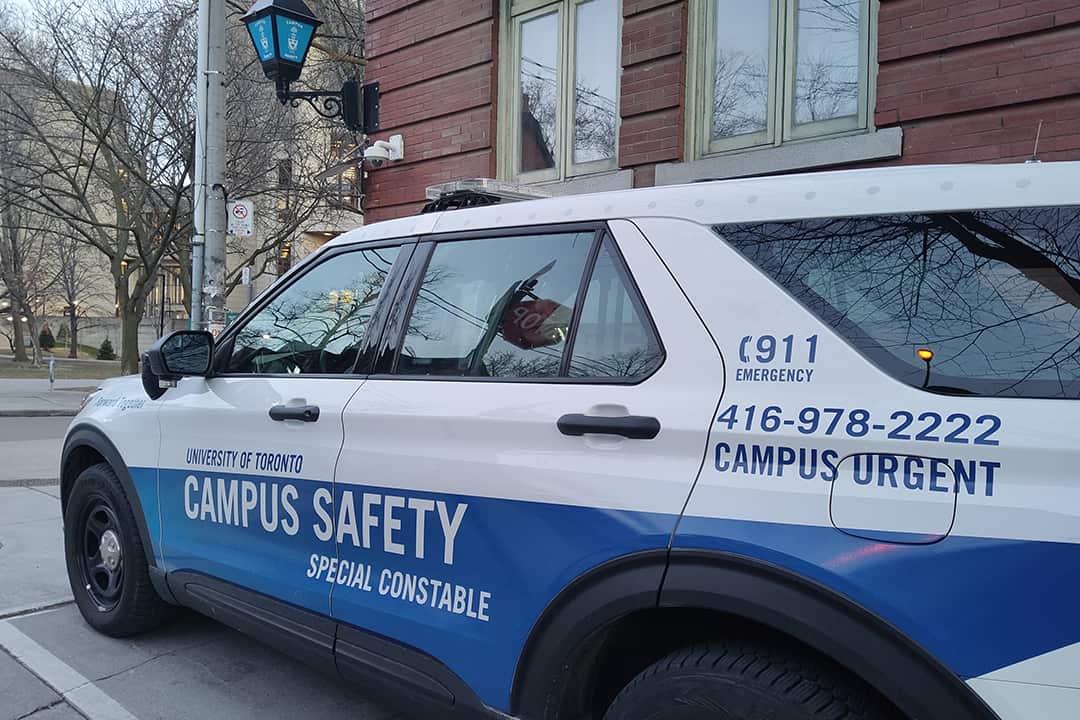Campus Safety is coming up frequently in campus news, from the university’s actions on recent acts of voyeurism to criticisms in the UTSU all-candidates debate. You may have logistical questions: what can Campus Safety constables do? How do Campus Safety and the regional police differ?
The Varsity is here to break down some of the three Campus Safety branches’ responsibilities and powers, looking specifically at its role in responding to students affected by sexual assault and mental health crises.
What are Campus Safety special constables?
U of T operates three branches of Campus Safety, one on each campus. The Province of Ontario appoints U of T’s Special Constables. The Toronto Police Services Board and Peel Police Service Board manage the constables, granting members of Campus Safety the authority of police officers under the Police Services Act while on tri-campus properties. Constables can respond to criminal offences — such as sexual assault, drinking and driving, and possession of a firearm — and provincial offences — such as parking breaches, being intoxicated in a public place, and trespassing. They can make arrests and transport prisoners within Toronto.
According to the university, constables receive training specific to campus on topics such as crime prevention, assisting victims of crimes, and emergency response. The 2019 Comprehensive Ontario Police Services Act requires special constables to also receive training on racial profiling, anti-oppression, and community-based policing.
Students, staff, and faculty members can download the U of T Safety App to send their current location to Campus Safety in the event of an emergency or to request an escort from a Special Constable to and from any U of T building or nearby transit stations. People can also access the service by calling 416-978-7233, or, without a mobile device, by visiting Campus Safety Communications offices at UTSG, UTM, and UTSC.
How Campus Safety responds to sexual assault
Special Constables conduct the university’s investigations related to sexual assault and voyeurism. According to U of T’s Policy on Sexual Violence and Sexual Harassment (PSVSH), U of T community members can file a formal report of sexual violence they experience or see another person experience to the university’s Sexual Violence Prevention & Support Centre (SVPSC), to Campus Safety, or via 911. People can also make these reports “at a later date following the incident.”
In emergencies, if someone makes a report to a different U of T entity, the PSVSH says they “will be directed to make a Report to Campus Safety.” Whenever Campus Safety receives an emergency report of sexual violence, the policy requires that it contact the Centre and municipal police services.
The SVPSC can also provide support to those who have experienced, heard about, witnessed, or are supporting someone affected by sexual violence through consultations provided in person, by phone, e-mail, or video conferencing.
In terms of student-run resources, the Prevention, Empowerment, Advocacy, Response, for Survivors (PEARS) Project — a student-led coalition — provides peer support and resources to survivors of sexual violence at U of T. Students can contact the group through Instagram, email, in-person, or by call.
In the past, student groups — including PEARS — have criticized the SVPSC for a lack of responsiveness and have brought up concerns to the university that many students may not feel comfortable approaching Campus Safety.
How Campus Safety responds to mental health crises
Many students have criticized Campus Safety for its handling of mental health crises in the past, particularly in the wake of a 2019 incident where Campus Safety handcuffed a student experiencing a mental health crisis.
In spring 2021, U of T administrators convened a committee to review Campus Safety’s role in responding to students’ mental health crises. It formed this committee because of recommendations from the Presidential & Provostial Task Force on Mental Health in 2019. following criticisms from activists about U of T’s mental health services, including around the 2019 incident.
The report released by the 2021 committee recommended that U of T increase training and create a crisis response team that would act as an alternative to Campus Safety when responding to mental health crises. An October 2022 response to this report from the U of T administration said the university had provided more opportunities for training Campus Safety officers, explored new crisis response-team solutions, and promised to provide “additional updates as work progresses.”
In April 2022, UTSC Campus Safety hired a community crisis response coordinator who accompanies special constables on calls related to student mental health crises. According to UTM Campus Safety’s 2022 annual report — the most recent annual report released by the branch — the coordinator is tasked with providing biannual training to members of all three campus safeties.
UTSG Campus Safety has also hired a community crisis response coordinator as part of its Community Liaison and Support Team, which includes staff who offer support with investigations, safety reviews, and other safety-related services alongside the Special Constables.


